“Tunisia's 2011 uprising created fertile ground for jihadist recruiters. Hundreds of Islamist militants were freed from prison as part of an amnesty for those detained under Ben Ali. Ultra-conservative salafists began to flex their muscle, seizing control of mosques and clashing with secularists. As Tunisia's politics have stabilised, the government has reasserted control, taking back mosques, banning the local al Qaeda affiliate Ansar al Sharia, and forcing many militants to flee. At first the jihadists mostly headed to Syria. But now Libya is more popular with them – many Tunisians have become key figures in Islamic State there. After a U.S. air strike killed a Tunisian jihadist commander in western Libya in late February, dozens of Islamic State fighters sneaked across the border into Tunisia and attacked an army barracks and police bases in the town of Ben Guerdane. In the battle that followed, Islamic State militants shot dead local Tunisian anti-terrorism chief Colonel Abdel Atti Abdelkabir metres from his home. Residents including the colonel's brother say they recognised some of the attackers as former neighbours and classmates who had left to train with Islamic State in Libya. In all, more than 50 militants died in the assault. The battle was further evidence of how Libya’s chaos has spilled over into its more stable neighbour. Tunisia, one of the most secular countries in the Arab world, is trying to nurture the nascent democracy that grew out of its 2011 uprising against Zine El-Abidine Ben Ali. But it also faces an intensifying battle against Islamist militants – not least Tunisian fighters now based just across the border. Officials estimate that between 4,000-6,000 Tunisians have left to fight for Islamic State and other groups, among them university graduates and professionals recruited online”. – Zohra Bensemra, Patrick Markey and Tarek Amara via Reuters
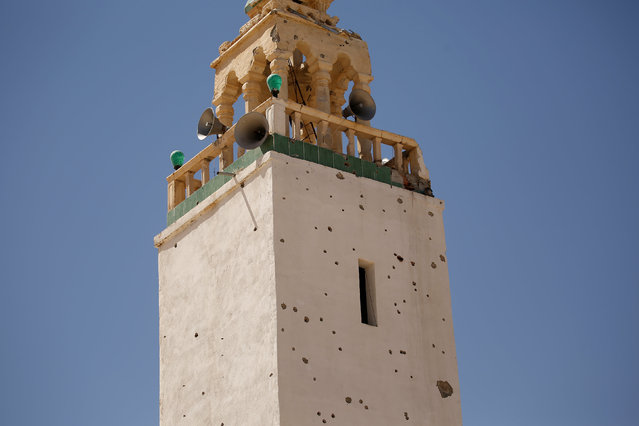
A minaret, that was damaged during fighting between Islamic State jihadists and government forces, is seen in Ben Guerdane, near the Libyan border, Tunisia April 10, 2016. After a U.S. air strike killed a Tunisian jihadist commander in western Libya in late February, dozens of Islamic State fighters sneaked across the border into Tunisia and attacked an army barracks and police bases in the town of Ben Guerdane. In the battle that followed, Islamic State militants shot dead local Tunisian anti-terrorism chief Colonel Abdel Atti Abdelkabir metres from his home. Residents including the colonel's brother say they recognised some of the attackers as former neighbours and classmates who had left to train with Islamic State in Libya. In all, more than 50 militants died in the assault. The battle was further evidence of how Libya’s chaos has spilled over into its more stable neighbour. Tunisia, one of the most secular countries in the Arab world, is trying to nurture the nascent democracy that grew out of its 2011 uprising against Zine El-Abidine Ben Ali. But it also faces an intensifying battle against Islamist militants – not least Tunisian fighters now based just across the border. (Photo by Zohra Bensemra/Reuters)
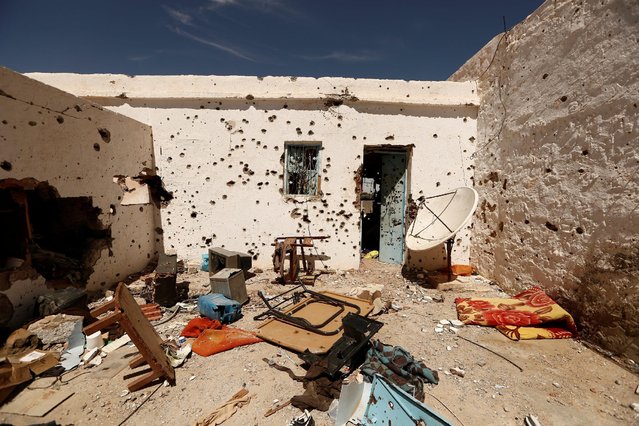
Household items lie on the ground at a house that was squatted by Islamic State jihadists and damaged during fighting with government forces in Ben Guerdane, near the Libyan border, Tunisia April 10, 2016. (Photo by Zohra Bensemra/Reuters)
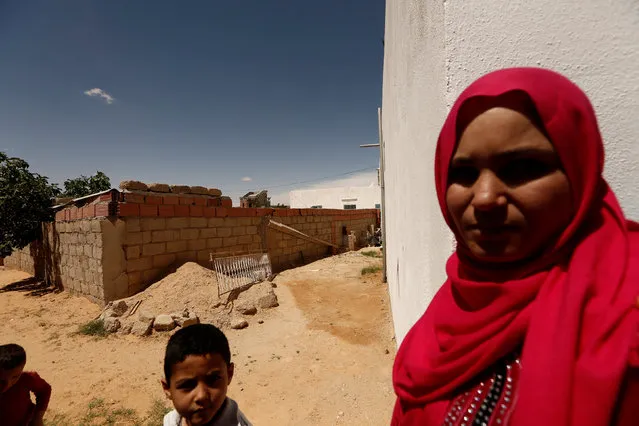
People stand where their neighbour Abdel Atti Abdelkabir, a policeman, was killed by Islamic State jihadists in Ben Guerdane, near the Libyan border, Tunisia April 10, 2016. (Photo by Zohra Bensemra/Reuters)
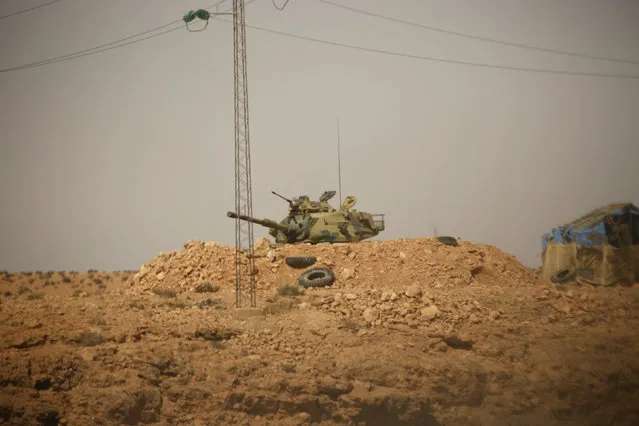
A Tunisian security forces tank is seen through a car window at Dhiba by the Tunisian and Libyan border crossing, Tunisia April 11, 2016. Tunisia's 2011 uprising created fertile ground for jihadist recruiters. Hundreds of Islamist militants were freed from prison as part of an amnesty for those detained under Ben Ali. Ultra-conservative salafists began to flex their muscle, seizing control of mosques and clashing with secularists. As Tunisia's politics have stabilised, the government has reasserted control, taking back mosques, banning the local al Qaeda affiliate Ansar al Sharia, and forcing many militants to flee. At first the jihadists mostly headed to Syria. But now Libya is more popular with them - many Tunisians have become key figures in Islamic State there. In all, officials estimate that between 4,000-6,000 Tunisians have left to fight for Islamic State and other groups, among them university graduates and professionals recruited online. (Photo by Zohra Bensemra/Reuters)
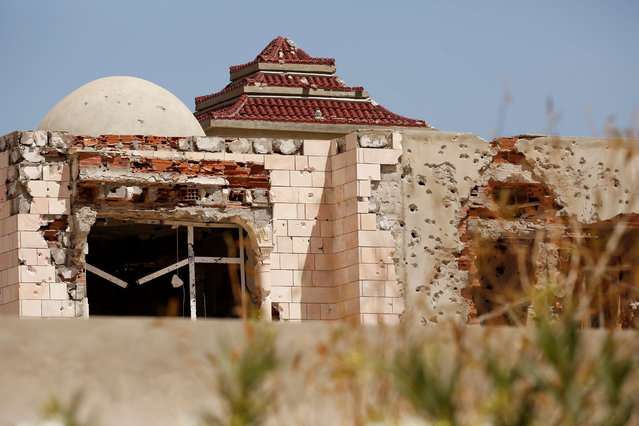
A house which was damaged during fighting with government forces stands in Ben Guerdane, near the Libyan border, Tunisia April 10, 2016. (Photo by Zohra Bensemra/Reuters)
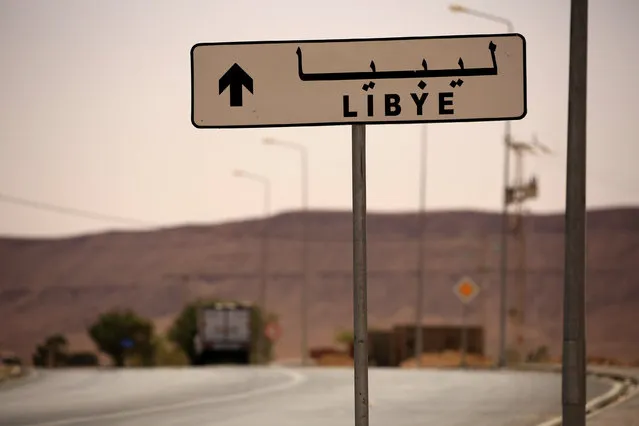
A road sign shows the direction of Libya near the border crossing at Dhiba, Tunisia April 11, 2016. (Photo by Zohra Bensemra/Reuters)
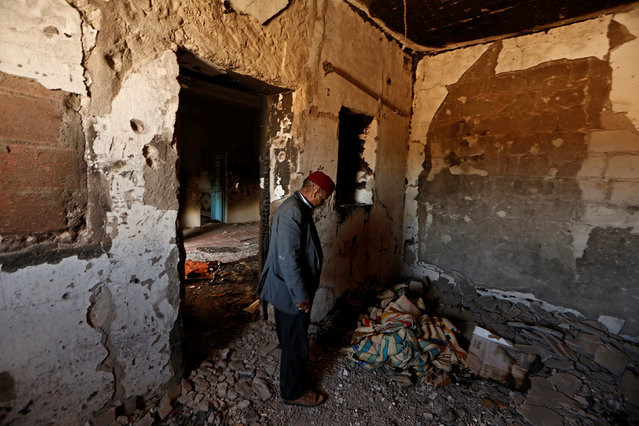
Hamid Ishi stands in his house, which was squatted by Islamic State jihadists and damaged during fighting with government forces, in Ben Guerdane, Tunisia April 10, 2016. (Photo by Zohra Bensemra/Reuters)
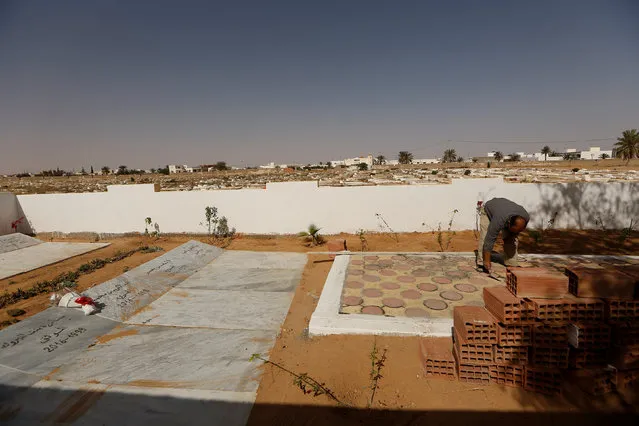
A municipal worker adds the finishing touches in Martyr's Square to a memorial to those recently killed by Islamic State's fighters in Ben Guerdane, near the Libyan border, Tunisia April 12, 2016. (Photo by Zohra Bensemra/Reuters)
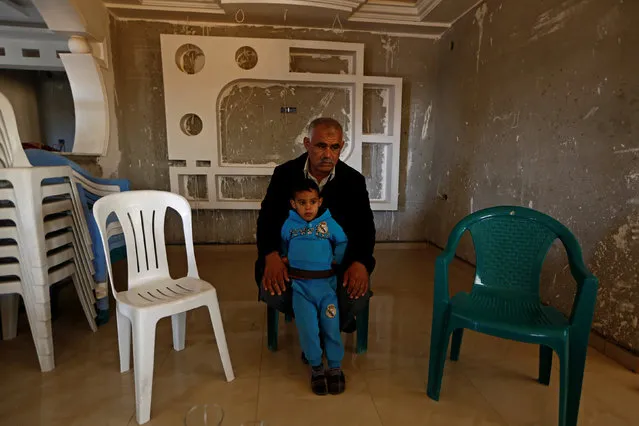
The father and son of Abdel Atti Abdelkabir, a policeman who was killed by Islamic State jihadists, pose for a picture in Ben Guerdane, Tunisia April 10, 2016. (Photo by Zohra Bensemra/Reuters)
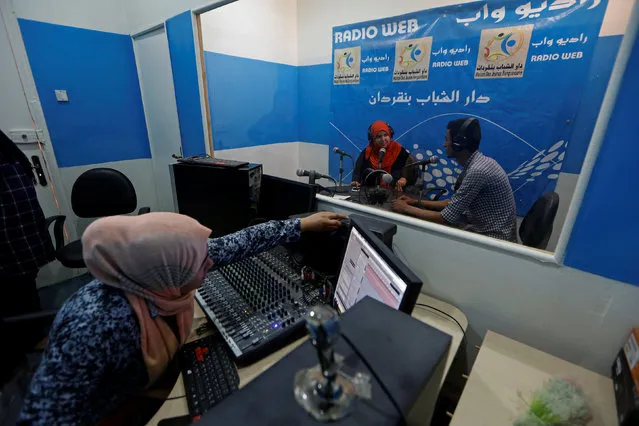
People are seen at a Radio Web studio during training at a youth centre in Ben Guerdane, Tunisia April 12, 2016. (Photo by Zohra Bensemra/Reuters)
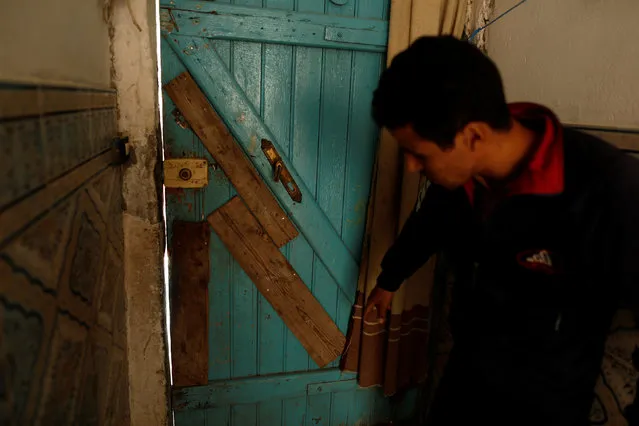
A man who's brother,Tarak Slimi, is suspected to have joined Islamic State in Libya, shows how the family managed to board up a door after it was damaged during a police raid in El Kef, Tunisia April 14, 2016. (Photo by Zohra Bensemra/Reuters)
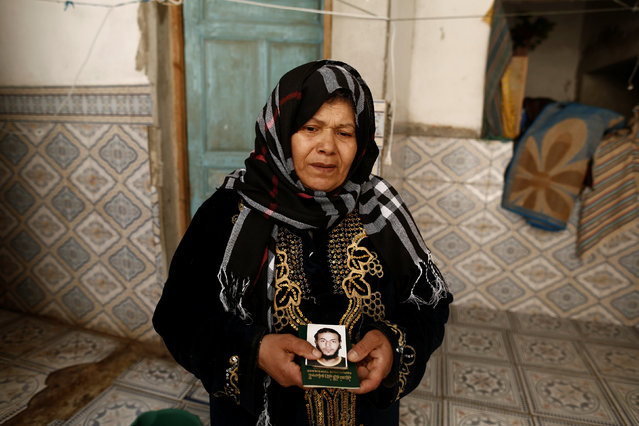
Fethiya Charni holds a photograph and the passport of her son Tarak Slimi, who is suspected to have joined Islamic State in Libya, at her house in El Kef, Tunisia April 14, 2016. (Photo by Zohra Bensemra/Reuters)
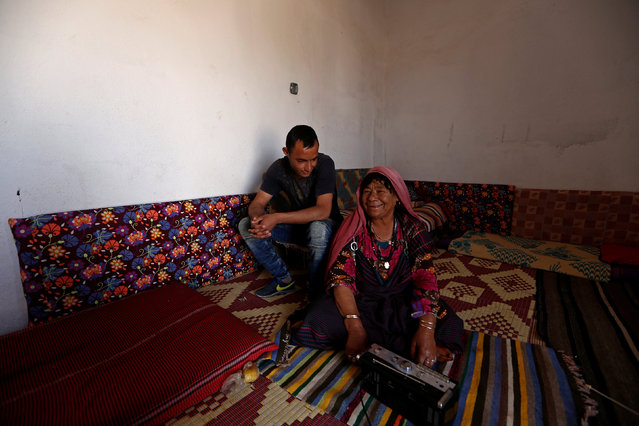
Yarusi Kadi, 21 (C), an unemployed graduate, smiles as he poses for a photograph with his grandmother at his house in the town of Remada, Tunisia April 11, 2016. (Photo by Zohra Bensemra/Reuters)
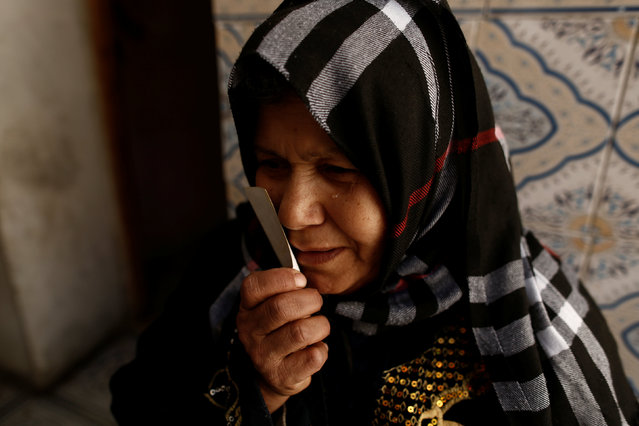
Fethiya Charni, weeps as she holds a photograph and the passport of her son Tarak Slimi, who is suspected to have joined Islamic State in Libya, at her house in El Kef, Tunisia April 14, 2016. (Photo by Zohra Bensemra/Reuters)
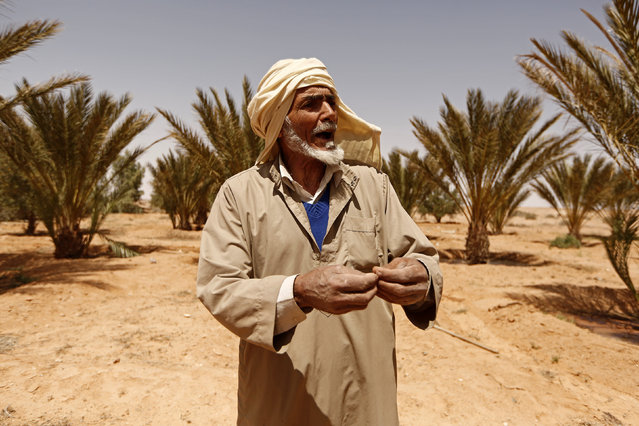
Yahya, father of Bechar Zongya, gestures during an interview with Reuters journalists in the town of Remada, Tunisia April 11, 2016. (Photo by Zohra Bensemra/Reuters)
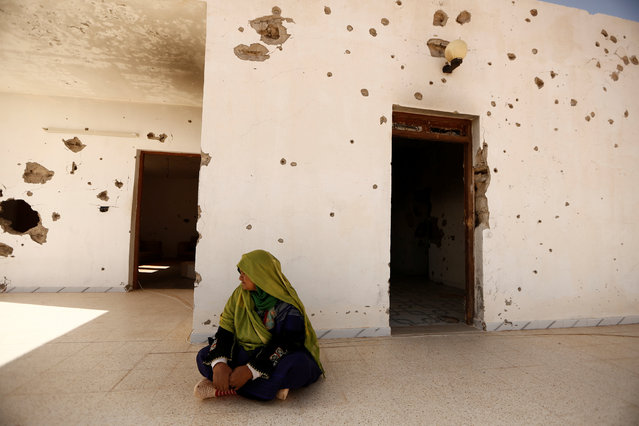
A woman sits outside her house, which was damaged in fighting between Islamic State jihadists and government forces, in Ben Guerdane, near the Libyan border, Tunisia April 12, 2016. (Photo by Zohra Bensemra/Reuters)
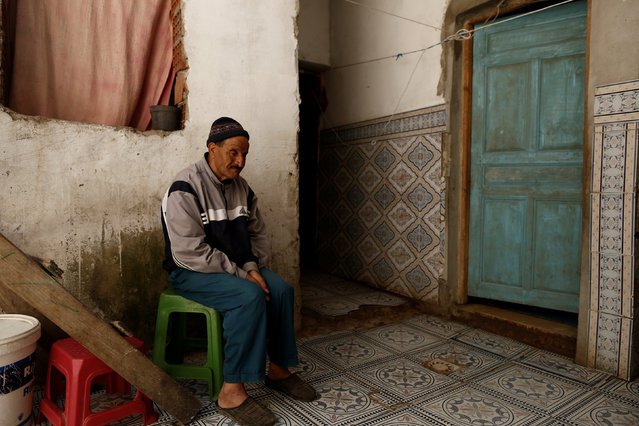
Mohamed Slimi, whose son Tarak Slimi is suspected to have joined Islamic State in Libya, sits at his house in El Kef, Tunisia April 14, 2016. (Photo by Zohra Bensemra/Reuters)
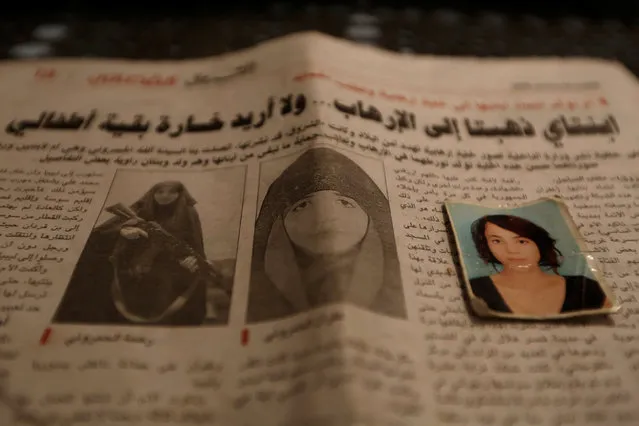
Photographs of Rahma (L), the wife of Noureddine Chouchane, a jihadist who was killed during a U.S strike in Libya, and her sister Gofran (R), are seen in a newspaper in Tunis, Tunisia April 14, 2016. (Photo by Zohra Bensemra/Reuters)
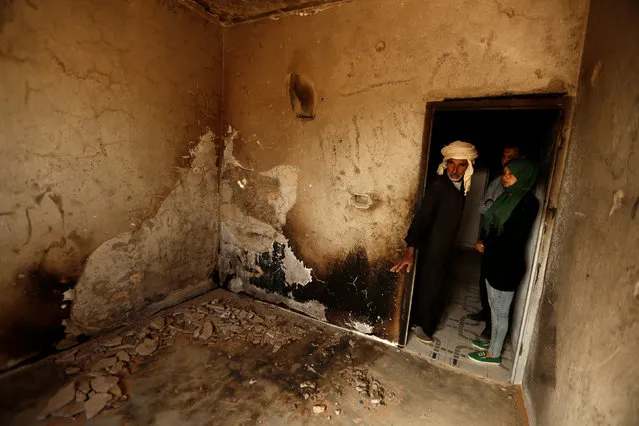
People inspect a burnt room inside their house, which was damaged by fighting between Islamic State jihadists and government forces in Ben Guerdane, near the Libyan border, Tunisia April 12, 2016. (Photo by Zohra Bensemra/Reuters)
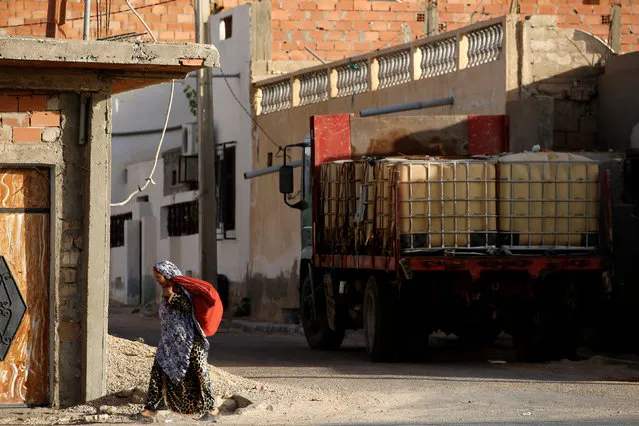
A woman walks past a truck loaded with containers in the town of Remada, Tunisia April 11, 2016. (Photo by Zohra Bensemra/Reuters)
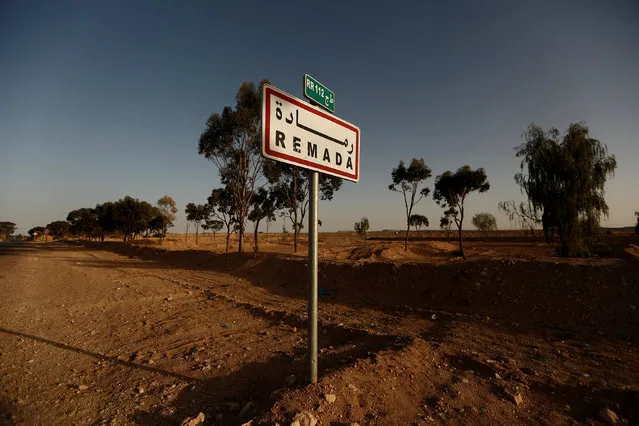
A sign is seen at the edge of Remada, Tunisia April 11, 2016. (Photo by Zohra Bensemra/Reuters)
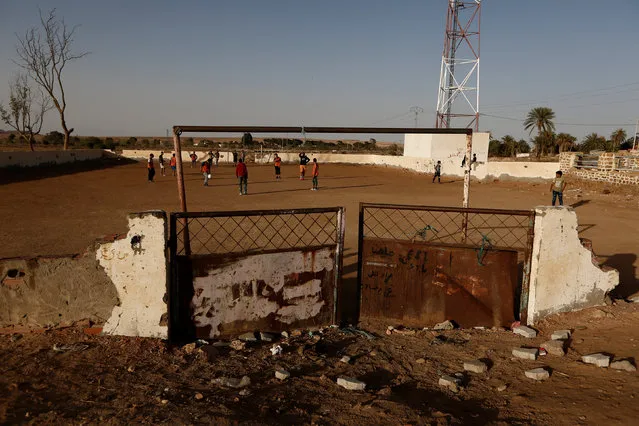
Men play soccer at a pitch in the town of Remada, Tunisia April 11, 2016. (Photo by Zohra Bensemra/Reuters)

A minaret, that was damaged during fighting between Islamic State jihadists and government forces, is seen in Ben Guerdane, near the Libyan border, Tunisia April 10, 2016. After a U.S. air strike killed a Tunisian jihadist commander in western Libya in late February, dozens of Islamic State fighters sneaked across the border into Tunisia and attacked an army barracks and police bases in the town of Ben Guerdane. In the battle that followed, Islamic State militants shot dead local Tunisian anti-terrorism chief Colonel Abdel Atti Abdelkabir metres from his home. Residents including the colonel's brother say they recognised some of the attackers as former neighbours and classmates who had left to train with Islamic State in Libya. In all, more than 50 militants died in the assault. The battle was further evidence of how Libya’s chaos has spilled over into its more stable neighbour. Tunisia, one of the most secular countries in the Arab world, is trying to nurture the nascent democracy that grew out of its 2011 uprising against Zine El-Abidine Ben Ali. But it also faces an intensifying battle against Islamist militants – not least Tunisian fighters now based just across the border. (Photo by Zohra Bensemra/Reuters)

Household items lie on the ground at a house that was squatted by Islamic State jihadists and damaged during fighting with government forces in Ben Guerdane, near the Libyan border, Tunisia April 10, 2016. (Photo by Zohra Bensemra/Reuters)

People stand where their neighbour Abdel Atti Abdelkabir, a policeman, was killed by Islamic State jihadists in Ben Guerdane, near the Libyan border, Tunisia April 10, 2016. (Photo by Zohra Bensemra/Reuters)

A Tunisian security forces tank is seen through a car window at Dhiba by the Tunisian and Libyan border crossing, Tunisia April 11, 2016. Tunisia's 2011 uprising created fertile ground for jihadist recruiters. Hundreds of Islamist militants were freed from prison as part of an amnesty for those detained under Ben Ali. Ultra-conservative salafists began to flex their muscle, seizing control of mosques and clashing with secularists. As Tunisia's politics have stabilised, the government has reasserted control, taking back mosques, banning the local al Qaeda affiliate Ansar al Sharia, and forcing many militants to flee. At first the jihadists mostly headed to Syria. But now Libya is more popular with them - many Tunisians have become key figures in Islamic State there. In all, officials estimate that between 4,000-6,000 Tunisians have left to fight for Islamic State and other groups, among them university graduates and professionals recruited online. (Photo by Zohra Bensemra/Reuters)

A house which was damaged during fighting with government forces stands in Ben Guerdane, near the Libyan border, Tunisia April 10, 2016. (Photo by Zohra Bensemra/Reuters)

A road sign shows the direction of Libya near the border crossing at Dhiba, Tunisia April 11, 2016. (Photo by Zohra Bensemra/Reuters)

Hamid Ishi stands in his house, which was squatted by Islamic State jihadists and damaged during fighting with government forces, in Ben Guerdane, Tunisia April 10, 2016. (Photo by Zohra Bensemra/Reuters)

A municipal worker adds the finishing touches in Martyr's Square to a memorial to those recently killed by Islamic State's fighters in Ben Guerdane, near the Libyan border, Tunisia April 12, 2016. (Photo by Zohra Bensemra/Reuters)

The father and son of Abdel Atti Abdelkabir, a policeman who was killed by Islamic State jihadists, pose for a picture in Ben Guerdane, Tunisia April 10, 2016. (Photo by Zohra Bensemra/Reuters)

People are seen at a Radio Web studio during training at a youth centre in Ben Guerdane, Tunisia April 12, 2016. (Photo by Zohra Bensemra/Reuters)

A man who's brother,Tarak Slimi, is suspected to have joined Islamic State in Libya, shows how the family managed to board up a door after it was damaged during a police raid in El Kef, Tunisia April 14, 2016. (Photo by Zohra Bensemra/Reuters)

Fethiya Charni holds a photograph and the passport of her son Tarak Slimi, who is suspected to have joined Islamic State in Libya, at her house in El Kef, Tunisia April 14, 2016. (Photo by Zohra Bensemra/Reuters)

Yarusi Kadi, 21 (C), an unemployed graduate, smiles as he poses for a photograph with his grandmother at his house in the town of Remada, Tunisia April 11, 2016. (Photo by Zohra Bensemra/Reuters)

Fethiya Charni, weeps as she holds a photograph and the passport of her son Tarak Slimi, who is suspected to have joined Islamic State in Libya, at her house in El Kef, Tunisia April 14, 2016. (Photo by Zohra Bensemra/Reuters)

Yahya, father of Bechar Zongya, gestures during an interview with Reuters journalists in the town of Remada, Tunisia April 11, 2016. (Photo by Zohra Bensemra/Reuters)

A woman sits outside her house, which was damaged in fighting between Islamic State jihadists and government forces, in Ben Guerdane, near the Libyan border, Tunisia April 12, 2016. (Photo by Zohra Bensemra/Reuters)

Mohamed Slimi, whose son Tarak Slimi is suspected to have joined Islamic State in Libya, sits at his house in El Kef, Tunisia April 14, 2016. (Photo by Zohra Bensemra/Reuters)

Photographs of Rahma (L), the wife of Noureddine Chouchane, a jihadist who was killed during a U.S strike in Libya, and her sister Gofran (R), are seen in a newspaper in Tunis, Tunisia April 14, 2016. (Photo by Zohra Bensemra/Reuters)

People inspect a burnt room inside their house, which was damaged by fighting between Islamic State jihadists and government forces in Ben Guerdane, near the Libyan border, Tunisia April 12, 2016. (Photo by Zohra Bensemra/Reuters)

A woman walks past a truck loaded with containers in the town of Remada, Tunisia April 11, 2016. (Photo by Zohra Bensemra/Reuters)

A sign is seen at the edge of Remada, Tunisia April 11, 2016. (Photo by Zohra Bensemra/Reuters)

Men play soccer at a pitch in the town of Remada, Tunisia April 11, 2016. (Photo by Zohra Bensemra/Reuters)
26 May 2016 12:29:00,
post received
0 comments
